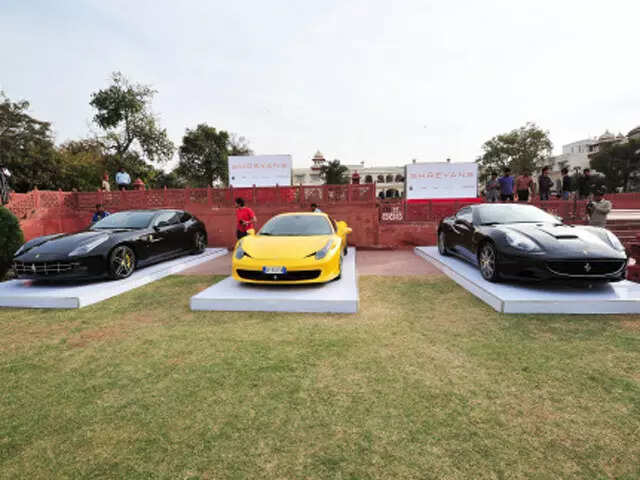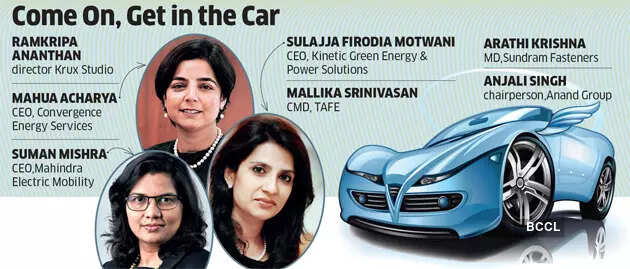
Industrial design is traditionally a male-dominated field, but one segment of it, automobile design, is seeing women break through the glass ceiling and make a mark.
Like Ramkripa Ananthan, director at Krux Studio, who has created a concept electric vehicle using upcycled material for last-mile connectivity. And Mahua Acharya and Suman Mishra, who have broken stereotypes and favourably ensconced themselves in productive roles in the auto industry. And many others like Sulajja Firodia Motwani, Mallika Srinivasan, Arathi Krishna and Anjali Singh are leading from the front in their respective auto-related family businesses.
The trickle of women who are entering the male-dominated world of automobile assembly, manufacturing, designing and leadership, is growing into a steady flow.
Manufacturers are waking up to realise what women can bring to the table, especially the advantages of diversity in promoting creative output.
“In future, a lot of automotive design will be focussed on UI/ UX (user interface/user experience) considering the mega trends of autonomous, connected, electric and shared mobility. With this, more women will consider a career in automotive design,” says Ananthan.
Experts point out that automobile plants are getting automated for better delivery. “There are very few shop floors in the organised sector today that need the application of physical strength,” they say, which is facilitating the presence of women on shop floors.
EV INDUSTRY’S LEG-UP
The male stereotype ceiling is slowly breaking and the sunrise electric vehicle industry is only hastening its momentum.
Rashmi Urdhwareshe, former director of the Automotive Research Association, and now the president of SAE India, says: “It is easier to be a significant part of the EV ecosystem as women can seamlessly play a big role in data analysis, simulation, validation, mobility solutions and disruptive technology processes of this industry”.
In fact Sulajja Firodia Motwani, the founder and CEO of Kinetic Green, who is focusing on her company’s electric transition, says, “developing a pathbreaking electric vehicle technology, with a vision to bring it within the reach of millions has been the most exciting phase.”
“We are currently at the cusp of a revolution in mobility, with the advent of electric vehicle technology having reached an inflection point. This, combined with other mobility trends like shared mobility, is changing the landscape dramatically,” Motwani said.
Mobility and automobiles are more about electronics and software now and that’s creating new opportunities for women – many EV factories now are “manned” by women. Even EV components like motors and controllers are electronics-based, where women are playing a key role not only in R&D but actual assembly and manufacturing.
THE CHALLENGES
While the sector is inclusive, the industry at large has been facing numerous challenges. “We need more skilled people, better infrastructure and more investment into the manufacturing sector,” said Arathi Krishna, MD, Sundram Fasteners. “Sundram Fasteners, which had a traditionally male-dominated environment, quickly adopted a woman boss and allowed me to grow and deliver,” she says. Krishna admits that automotive manufacturing has always been a man’s world.
“It was tough breaking into the automotive design field as there were very few companies doing new product development with design studios in India and hiring talent,” said Ananthan who founded Krux Studio in 2021 and is the former head of design at Mahindra & Mahindra having designed Scorpio,XUV700 and the Thar.
“For design to be relevant or successful, the company’s vision has to be clear and product definition has to be good. I had to learn or upskill and be able to influence related areas like customer insight and vehicle architecture to successfully deliver what was expected from my role,” Ananthan said.
“Although things are changing slowly with the advent of electric mobility, more needs to happen at all levels of the industry –– technicians, shop floor workers, engineers, managers, and leadership. This is a sunrise industry and this is the time to get things right,” said Mahua Acharya, MD & CEO of CESL, the energy transition subsidiary company of state-owned Energy Efficiencies Services which is spearheading an EV transition in public transportation.
For women like Suman Mishra, the head of EV business at Mahindra & Mahindra, the shift to EV business was a natural transition. “There have been certain trade-offs to strike a balance between personal and professional aspirations. To overcome them, there are three mantras: have a strong support system, ruthlessly prioritise and don’t sweat the small stuff,” says Mishra as she accelerates partnerships and tie-ups to bring innovative products to the market. As Mahindra’s last-mile mobility scales up manufacturing capacity and product range, it has significantly increased volumes and sales over the last few months in the electric three wheeler space .















